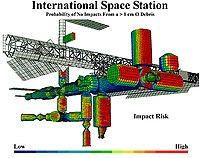
Photo from wikipedia
Abstract. Risk assessment constitutes the first part within the risk management framework and involves evaluating the importance of a risk, either quantitatively, or qualitatively. Risk assessment consists of three steps,… Click to show full abstract
Abstract. Risk assessment constitutes the first part within the risk management framework and involves evaluating the importance of a risk, either quantitatively, or qualitatively. Risk assessment consists of three steps, namely risk identification, risk estimation and risk evaluation. Nevertheless, the risk management framework also includes a fourth step, i.e. the need for a feedback of all the risk assessment undertakings. However, there is a lack of such feedback, which constitutes a serious deficiency in the reduction of environmental hazards at the present time. Risk identification of local or regional hazards involves hazard quantification, event monitoring including early warning systems and statistical inference. Risk identification also involves the development of a database, where historical hazard information and their effects is included. Similarly, risk estimation involves magnitude/frequency relationships and hazard economic costs. Furthermore, risk evaluation consists of the social consequences of the derived risk and involves cost-benefit analysis and community policy. The objective of this review paper is twofold: On one hand, to address meteorological hazards and extremes within the risk management framework. Analyses results and case studies over Mediterranean ecosystems with emphasis on the wider area of Greece, in the eastern Mediterranean, are presented for each of the three steps of risk assessment for several environmental hazards. The results indicate that the risk management framework constitutes an integrated approach for environmental planning and decision making. On the other hand, it shed light to advances and current trends in the considered meteorological and environmental hazards and extreme events, such as tornadoes, waterspouts, hailstorms, heat waves, droughts, floods, heavy convective precipitation, landslides and wildfires, using recorded datasets, model simulations and innovative methodologies.
Journal Title: Natural Hazards and Earth System Sciences
Year Published: 2020
Link to full text (if available)
Share on Social Media: Sign Up to like & get
recommendations!